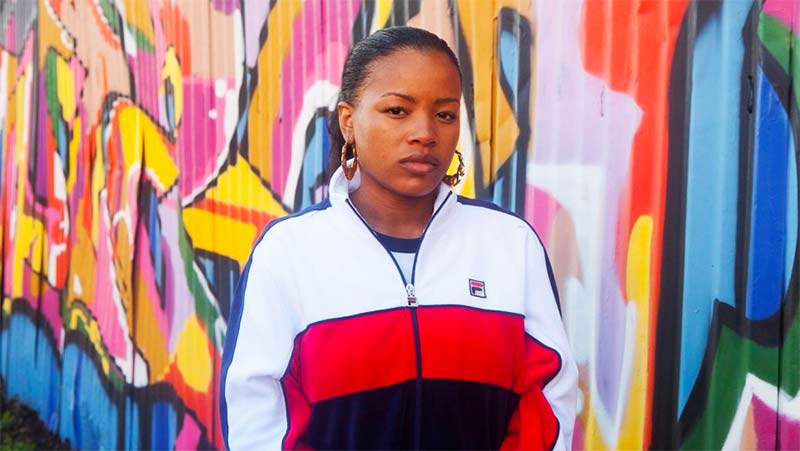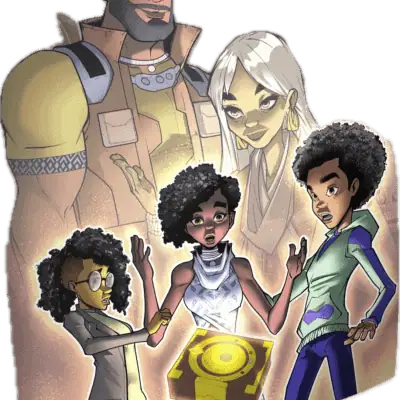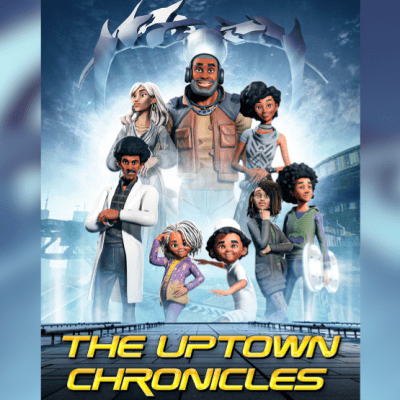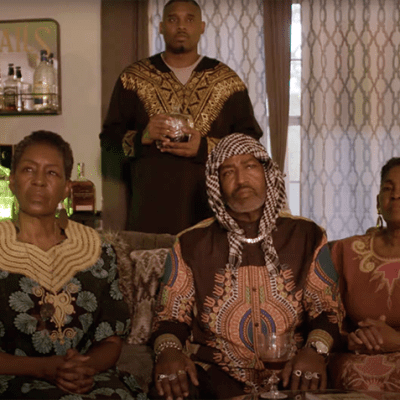
Ms. Roxanne Shante burst onto the New York hip hop scene as a teenage battle rapper killing the game way before I was even a thought. It is with this reverence that I approach the biopic Roxanne, Roxanne. My heart warmed at watching this young girl from Queens murdering dudes way older than her. It was fulfilling to witness her a “little girl” beat grown men in what they thought was their artform and theirs only. In the opening scene we follow Roxanne Shante and her friend/hypewoman/promoter/manager, Ranita, shouting her arrival, “The champ is here.” Roxanne approaches her opponent and stands on a crate to meet his eye. As she sizes him up she turns to her mother, Peggy, (Nia Long) and asks for permission to curse, to which her momma responds, “As long as you win that $50, I don’t care what you do.” I smiled watching these bold and confident young women as they supported each other in a male dominated space.
Roxanne Shante’s boldness translated well across scenes and it was empowering to watch a woman who knows her worth. Even as she has left home to escape her mother’s drunken bitterness she refuses to rap for free. Anyone who wants to come at her, who wants to battle, has to put their money where their mouth is and watch as she takes it away. Being careful not to romanticize, her paper chasin’ comes not simply out of desire, but necessity, as she is trying her best to financially support her family. Even still, seeing her hold her own in world filled with men trying to take advantage is admirable. Unfortunately more times than not her struggle was heartbreaking instead of triumphant – a real Sisyphus type situation.
While the violence and abuse is a part of her life story, it is often hard to watch because the obstacles she faces keep her from propelling into the heights her talent should have taken her. But as difficult as it is to witness, I cannot even begin to imagine how hard it was to live. It must have been frustrating to reign supreme as the battle queen in the talent house that was Queensbridge and have very little to show in comparison to your immense skill and all the time and energy you put into honing it. Nevertheless, this movie serves as a “lovesong” highlighting the contributions that black women have made to hip-hop. It shows women on the ground working to create the genre, not delayed additions but generators.
Because of my age, despite growing up in Jersey, only a train ride away from the City, the majority of this film was informative and educational. What I was able to latch onto was the familiar faces of Nia Long and Mahershala Ali, but only briefly. Their performances, as a neglectful drunken mother and controlling abusive, creepy, old ass, boyfriend, transformed these sexy icons into unsightly humans. In other words, Long and Ali really inhabited their characters.
When we first meet Long, who plays Roxanne’s mother, Peggy, she is in love and excited. She saved enough money to move her girls and her fiance out of the projects into a house. Then, her fiance leaves with her cash, ($20K to be exact) never to return; Peggy spirals into a drunken, bitter woman determined for her daughters not to fall for the okie doke like she did, by reminding them how treacherous and deceitful men are by spewing hateful declarations about them. The way that Long embodies the change from a loving mother to broken woman is remarkable. She visually transforms before our eyes. The same rings true for Ali who plays Cross. Roxanne first encounters Cross in the bodega and watches after his son while he runs an errand. During a time of desperation Roxanne bumps into him while sitting in his ride and lets her use his car phone. Cross initially seems like one of those old school drug dealers still connected to the community, wanting to help out when possible despite his profession. We realize the inaccurate perception as Cross quickly he turns into a disgusting predator. There is a scene where Peggy confronts Cross about his pedophilloic ways in which you are happy that she has this nasty, sour bite to which she demonstrates in her conversation with Cross.
This film offers such a condensed look into her life, seeming to span no more than ten years, that it left me wondering whatever happened to the star. Did she ever see the success of the fruits of her labor? Sadly it seems she did not. This is not to discredit what she was able to accomplish – breaking free from an abusive relationship, getting her family out the projects, raising her son, and running a nonprofit organization. It is more of a critique of the game at-large, where a woman who is so talented and so seasoned was thwarted and denied the opportunity to catapult herself into the fame and fortune she earned. Nevertheless this film does its part to solidify her contribution to hip-hop, the music of America.








